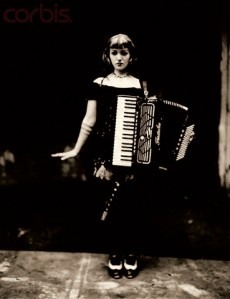 In honor of Women’s History Month, we’re celebrating overlooked and lesser known female musical artists from around the world. Though they may not be household names, in many cases they served as key influences on other artists who went on to be critical and commercial sensations. Their influence can still be felt strongly in the much of the music we listen to today, and many of them have fans and admirers from among today’s current music scene. In other words, these are artist’s artists—the ones in your favorite musicians’ personal record collections. So hunt them down, check them out, and let them show you why their names and their music should be on your lips. And while you’re at it, drop us a comment and let us know some of your favorite female musicians.
In honor of Women’s History Month, we’re celebrating overlooked and lesser known female musical artists from around the world. Though they may not be household names, in many cases they served as key influences on other artists who went on to be critical and commercial sensations. Their influence can still be felt strongly in the much of the music we listen to today, and many of them have fans and admirers from among today’s current music scene. In other words, these are artist’s artists—the ones in your favorite musicians’ personal record collections. So hunt them down, check them out, and let them show you why their names and their music should be on your lips. And while you’re at it, drop us a comment and let us know some of your favorite female musicians.
————————————————————————
Elizabeth Cotten (1895-1987)

Elizabeth Cotten was born in North Carolina in 1893. By the age of seven, she had begun teaching herself how to play her older brother’s banjo. She soon picked up the guitar as well and began writing her own songs. By the age of 12, Cotten was working as a maid alongside her mother and by 15 she was married and expecting her first child. With her new responsibilities, Cotten had little time for music and largely retired from playing for the next 25 years, only playing very occasionally at church meetings. While later living in Washington D.C. a chance meeting led Cotten to be employed as a maid by the famed folk musicologists Ruth and Charles Seeger, whose children included future musicians Pete, Peggy, and Mike. It was during this time that Cotten began playing music again on one of the many guitars lying around the Seeger home. The Seegers strongly encouraged her to perform her music—son Mike began recording her in 1952 and later produced her first record in 1957 (featuring her best known song, “Freight Train” which she wrote at the age of 12). Soon after she began performing her first live concerts (now in her late 60s) and touring the country, which was in the midst of the 1960s folk music revival. Cotten continued to record and tour for the next several decades, well into her 80s. Many of the songs she performed were among the earliest ones that she wrote, when just a child. Elizabeth Cotten died in Syracuse, New York in 1987.
Watch Elizabeth Cotten performing her song “Freight Train” with Pete Seeger below.
[youtube=http://www.youtube.com/watch?v=OMSYzFdloqY]

